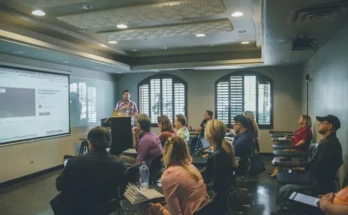Education isn’t just about memorizing facts, passing exams, or earning certificates. At its core, education is the foundation of human progress. It’s what fuels imagination, strengthens societies, and allows individuals to build meaningful lives—no matter the path they choose.
In today’s fast-changing world, education is more vital than ever. Whether you’re planning to land your dream job, launch a startup, master a trade, or simply understand the world around you, the value of education stretches far beyond the classroom. It empowers, enlightens, and equips people to take on life with confidence and purpose.
Let’s dive deep into what education truly means, why it matters in every walk of life, and how it has evolved into one of the most powerful tools anyone can hold.
The Evolution of Education:
-
A Journey Through Learning
Centuries ago, education was a privilege of the elite. Learning was limited to monasteries, royal courts, or scholarly circles. Over time, societies realized the undeniable power of knowledge and began building systems to share it widely.
From ancient Greek philosophers to medieval universities and industrial-era schools, the concept of education has grown and adapted. What began as the pursuit of wisdom for a few has become a universal right.
Today, education is not just about textbooks. It’s about critical thinking, creativity, collaboration, and preparing people for a world that never stops changing. It’s also about inclusion—reaching learners across geographies, economic classes, and abilities.
-
The Digital Shift in Modern Education
The 21st century brought an educational revolution. With the internet, knowledge is no longer confined to schools. You can learn coding at midnight, attend a university lecture on your phone, or earn a degree without ever stepping into a classroom.
Digital platforms, online courses, and virtual classrooms have transformed education into a borderless experience. Artificial intelligence is personalizing learning, while virtual reality is bringing science, history, and art to life.
Technology hasn’t replaced teachers, but it has redefined how and where learning happens. Education today is flexible, inclusive, and deeply connected to the tools and rhythms of modern life.
Education and Employment:
-
The Foundation of Any Job
Whether you aspire to be a doctor, software engineer, teacher, or artist, education gives you the language and structure of your chosen field. It teaches not just the “what,” but the “why” and “how.”
Employers look for more than technical knowledge. They value problem-solving, communication, adaptability, and leadership—skills honed through academic and experiential learning. A well-rounded education prepares you not just to do a job but to grow within it, to innovate, and to lead.
Even in trades and manual work, education in the form of vocational training ensures efficiency, safety, and professionalism. Knowledge transforms effort into expertise.
-
Lifelong Learning in a Changing Job Market
The job market is evolving faster than ever. Entire industries rise and fall in a decade. Roles that didn’t exist ten years ago—like social media manager or AI ethicist—are now career staples. Education doesn’t stop with a diploma; it’s a lifelong commitment.
Reskilling and upskilling have become necessities, not options. Continuous education helps people remain relevant, agile, and prepared for whatever comes next.
In a world where adaptability is currency, the habit of learning is one of the most valuable traits a person can have.
Education and Entrepreneurship:
-
Building Smarter Businesses
Many believe that starting a business is about hustle alone. While grit is essential, education plays a bigger role than most realize. Understanding finance, marketing, consumer behavior, and legal frameworks can mean the difference between success and failure.
Entrepreneurs who educate themselves make informed decisions. They know how to read markets, communicate vision, lead teams, and pivot when needed. Business schools, mentorship programs, and even YouTube tutorials help equip dreamers with the tools to bring their ideas to life.
Even creativity—often seen as instinctive—thrives with education. Learning how to pitch, prototype, test, and scale gives innovation a backbone.
-
Learning from Failure
Not every venture will succeed, but education helps turn failures into stepping stones. Entrepreneurs with a strong learning mindset analyze what went wrong, adapt, and return stronger. They understand that growth often comes through mistakes—and that learning is the compass guiding them forward.
In entrepreneurship, education is your quiet partner—always there to advise, support, and help you see the bigger picture.
Education and Personal Growth:
-
Building Character and Confidence
Education doesn’t just shape careers—it shapes character. It teaches responsibility, ethics, empathy, and self-awareness. Exposure to different subjects and perspectives builds open-mindedness and critical thinking.
From reading literature to debating social issues, education develops the inner voice that guides decisions and behavior. It empowers people to express themselves, challenge injustice, and contribute to society.
A well-educated individual is not necessarily someone with a degree but someone who thinks independently, listens actively, and acts with integrity.
-
Education as a Path to Freedom
Knowledge brings freedom—the freedom to choose, to speak, to create, and to lead. For marginalized communities around the world, education is often the first step toward liberation.
Girls in developing countries, for example, who receive an education are more likely to delay marriage, avoid poverty, and become leaders in their communities. Adults who return to school discover renewed purpose. Even learning to read later in life can open doors long believed closed.
Education unlocks not just doors but identities. It helps people become more than what their circumstances allow.
The Future of Education:
Education is no longer “one-size-fits-all.” With AI and data analytics, learning is becoming more tailored to individual needs. Students learn at their own pace, in their own style, focusing on their strengths while improving weaknesses.
Purpose-driven education is also on the rise. Instead of memorizing information, students are encouraged to solve real-world problems, work on projects that matter, and connect learning to life outside the classroom. The goal isn’t just academic success—it’s building meaningful lives, full of purpose, passion, and positive impact.
In a world of Google and ChatGPT, do we still need teachers? The answer is a resounding yes. Technology may provide information, but teachers provide interpretation, mentorship, and inspiration.
Great educators ignite curiosity, help students navigate uncertainty, and push them beyond comfort zones. As education evolves, the role of teachers becomes even more vital—not as lecturers, but as guides, facilitators, and lifelong learners themselves.
Conclusion:
No matter where life takes you—into the world of business, into employment, into creative fields, or simply into a fuller version of yourself—education will always be your greatest ally.
It is not confined to age, location, or background. It starts with curiosity and grows through effort, exposure, and openness.
Whether you’re sitting in a classroom, watching an online lecture, learning from a mentor, or reflecting on a mistake, you’re participating in one of the most powerful processes in existence: the pursuit of understanding.
So, wherever you are in life, never stop learning. Because behind every dream realized, every business built, and every challenge overcome, there’s a quiet but unstoppable force—education.




